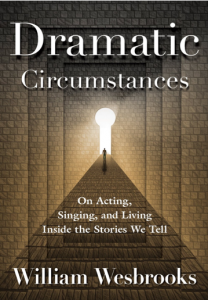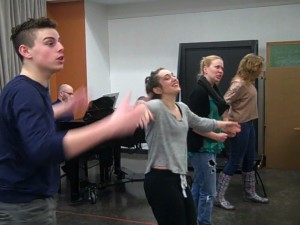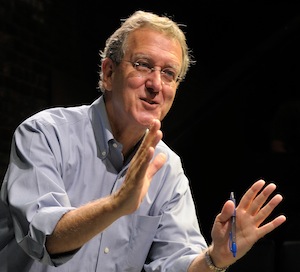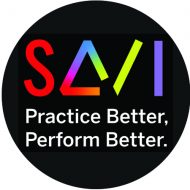 Once upon a time, there was a professor who taught singing actors about how to perform songs. He worked in a big city at a university with a big reputation, and many students came to study with him. He loved his work; he loved being able to help students, and the things he taught them were genuinely helpful. After awhile, he thought to himself, “Maybe I could help more students if I were to write about the ways I train my students in a book.”
Once upon a time, there was a professor who taught singing actors about how to perform songs. He worked in a big city at a university with a big reputation, and many students came to study with him. He loved his work; he loved being able to help students, and the things he taught them were genuinely helpful. After awhile, he thought to himself, “Maybe I could help more students if I were to write about the ways I train my students in a book.”
Yes, this is my story, but it’s also the story of Bill Wesbrooks, Director of Vocal Performance at the Steinhardt School of Culture, Education and Human Development at NYU. The difference between Bill and me is, he’s actually written the book. It’s called “Dramatic Circumstances,” it was published a few months ago, and it’s a great addition to the literature of singer-actor training.
Books about Singing-Acting
Since I began teaching thirty-five years ago, a surprising number of books have been published about the training of the singing actor. The two most prolific authors in the field are H. Wesley Balk and David Craig, both of whom passed away around the end of the millennium but each of whom managed to publish three enormously valuable books in the last years of their lives. Balk’s “The Complete Singer-Actor: Training for Music Theater” appeared in 1977, and though Balk was an opera director who worked chiefly with opera singers, the pedagogical principles he has identified and the exercises he has invented remain valuable to performers in all genres of musical theater. David Craig’s “On Singing Onstage” (1978) is an equally important early contribution to the field; since Craig is profoundly attuned to the Broadway repertoire, singers of show tunes are likely to find his work more immediately relevant. Balk went on to complete two more books, “Performing Power” (1985) and “The Radiant Performer” (1991) before he passed away in 2003, and Craig followed up his initial effort with “On Performing” (1987) and “A Performer Prepares” (1993) before his demise in 1998.
In more recent years, the onslaught of books for the singing actor has continued. The most impressive and comprehensive contribution to the literature in our own era is Joe Deer and Rocco DalVera’s “Acting in Musical Theatre” (2008), which is already headed for a second edition and being translated for the Asian market. All in all, by my count, more than a dozen books that have been published during the years since I began teaching in this field. In fact, Bill Wesbrooks’ volume is one of two to be published in the past few months; the other, “Stanislavski Never Wore Tap Shoes,” is the work of Burke Moses, a Broadway performer who began his performing career around the time that Balk and Craig were publishing their first books. (And yet the promotional copy for Moses’ book begins, “Finally, a book about acting on the musical stage!” “Finally?”)
Given this impressive array of books (not to mention the shelf space they occupy in my library) and the collective insights of their authors, I find myself wondering: Is there really something else that needs to be said?
A Focus on Story
Wesbrooks’ response to the challenge is to go deep rather than broad. He chooses a provocative focus for his teaching and his writing, digging deeply into the importance of STORY and how a student is well served to examine each song thoughtfully and imaginatively to determine the true story being told and the personal significance of that story. The subtitle of his book is, “On Acting, Singing, and Living Inside the Stories We Tell.”
In his preface, Bill quotes the English author Philip Pullman, who said, “After nourishment, shelter and companionship, stories are the thing we need most in the world.” Reading this immediately made me think of Dan Pink’s “A Whole New Mind,” a provocative 2005 study about moving from the “Information Age” to the “Conceptual Age.” In it, Pink identifies “Story” as one of six essential aptitudes that need to be mastered in order to flourish in the complex new era we currently inhabit.
“The essence of persuasion, communication and self-understanding has become the ability also to fashion a compelling narrative,” observes Pink. Quoting Don Norman’s “Things That Make Us Smart,” he wants us to understand that “[s]tories are important cognitive events, for they encapsulate, into one compact package, information, knowledge, context and emotion.”
Bill Wesbrooks is very wise to focus on the importance of story. It shows that he is attuned to the needs of artists and audiences in the present day. It also connects him to a rich tradition of actor training that stretches back to the seminal work of Konstantin Stanislavski, whose goal was to train actors so they could live truthfully under imaginary circumstances. Wesbrooks’ “dramatic circumstance process” owes a great deal to Stanislavski, and the fact that it is not wholly original doesn’t make it any less valuable. By describing this work in an organized and thoughtful way with concrete examples, Wesbrooks shows the aspiring singing actor “how to take specific steps to organize your thoughts so that you will be able to live more fully inside any story you choose to tell.” The payoff is a “new kind of freedom and clarity” evident in the work of students willing to employ this procedure diligently.
“It has been my experience that artists of all disciplines seek, in the pursuit of their art, two fundamental experiences: freedom and truth. … Freedom is the sensation of having liberated yourself from the limitations of self-consciousness that can constrict you as you study, practice, rehearse, and perform. Ultimate freedom is freedom from fear. … Truth is allowing yourself to see, with unadorned clarity, what you know about yourself and what you have learned in the course of your life about human behavior,. and then – and this is the key – having the courage to take action based on that knowledge.”
Practice Makes Perfect
 Readers of The SAVI Singing Actor know that I am very interested in the importance of practice as a tool for developing technique and achieving mastery, and Wesbrooks has some valuable words to contribute on that topic. He cites a British study that concluded the only statistically significant factor that had any impact on musicians’ success was the amount of time that had spent practicing: “It is a fact: the more you practice, the better you will get. [But] figuring out just how to practice is one of the biggest challenges most performers face.” In my experience, I have found this statement to be profoundly true, and one of the things my students seem to benefit from most is instruction in what and how to practice. I wrote about it most recently in an article called “Making The Most of Practice Time.”
Readers of The SAVI Singing Actor know that I am very interested in the importance of practice as a tool for developing technique and achieving mastery, and Wesbrooks has some valuable words to contribute on that topic. He cites a British study that concluded the only statistically significant factor that had any impact on musicians’ success was the amount of time that had spent practicing: “It is a fact: the more you practice, the better you will get. [But] figuring out just how to practice is one of the biggest challenges most performers face.” In my experience, I have found this statement to be profoundly true, and one of the things my students seem to benefit from most is instruction in what and how to practice. I wrote about it most recently in an article called “Making The Most of Practice Time.”
Since singing-acting involves both a rich inner life and the outward expression of that inner state through behavior, there are many points of view about whether singing-acting training should use an “inside-out” approach or an “outside-in” one. Wesbrooks’ view is similar to mine, and to the approach that Wes Balk developed in his three books:
“To think of your emotional life as somehow ‘inside’ while your physical life is ‘outside’ is already a perception that denies the complex interaction between the various parts of your mind and your body. Your emotional self and your physical self are forever intertwined and totally dependent on one another. … Of course you want to find a true emotional connection in your work, and the dramatic circumstance process is the most effective way I have found to bring that about. Even so, emotionally connected work will be diminished, and your ability to sustain it will be seriously compromised, if your body and voice are not at the same time functioning both efficiently and effectively.”
A Fine Addition to the Literature
 Bill Wesbrooks has written a fine book. He is an intelligent, humane teacher, dedicated to his students’ growth; his calm, reassuring demeanor and generosity of spirit shine forth on every page. The work he describes in the pages of his book is important work that every singing actor needs to undertake.
Bill Wesbrooks has written a fine book. He is an intelligent, humane teacher, dedicated to his students’ growth; his calm, reassuring demeanor and generosity of spirit shine forth on every page. The work he describes in the pages of his book is important work that every singing actor needs to undertake.
It doesn’t diminish Bill’s accomplishment to point out that he clearly stands on the shoulders of others who have gone before him; the same can be said for nearly everyone in every field of endeavor. Stanislavski’s influence is evident, not just in the types of work and the procedures that Bill encourages his students to employ, but in the way he has chosen to present much of his work in the form of dialog between teacher and student, much as Stanislavski did. The seminal work of David Craig, especially his 1978 book “On Singing Onstage,” also appears to have influenced Wesbrooks’ approach; the forensic gathering of information from the song’s text that Craig calls the “One” and the personalized “This is a story about me” approach employed in his “Two” are a foundation on which Wesbrooks has skillfully built.
This is a book which other teachers of singing acting will want to study, so they can incorporate Wesbrooks” “dramatic circumstances process” in their own studio practice. Students will also benefit from his lessons, providing they take the time to peruse the material thoughtfully and put it into practice methodically. We are, I fear, a quick-fix culture, one reliant on the charismatic influence of experts, and Wesbrooks’ approach is not a hard-sell one. I admire that about his book, but I don’t know whether it will win him many acolytes.
On that theme, then, here’s another story to conclude this post:
Once upon a time, there was a young woman who loved to sing songs. She dreamed of success on the musical stage, and thought that the grandest possible thing would be to get a job to perform in a Broadway show. She knew that, in order to do this successfully, she needed to get some training, because as much as she loved singing songs, she had a feeling that there were certain skills that she needed to have to sing them better, to sing them in a way that would give her performances greater impact. She wanted to attend college at a university in a big city where she knew she would learn more about these things, but the college was very expensive and the big city was far away.
And then one day she stumbled upon a book called “Dramatic Circumstances,” written by a teacher who taught at the school she where she longed to study. Reading this book, she could imagine what it was like to attend his class. The book offered detailed accounts of the teacher’s interactions with the students in his class, accounts of the work they did exploring songs and preparing to perform them. In the book, the teacher sounded like a kind and wise man, and the students in the book all got great benefit from his lessons.
What happened next?
(1) She followed the instructions and the procedures described in the book, and discovered that she sang better when she prepared her songs that way. She felt happier and more successful.
Or…
(2) She read the book and felt even more determined to study with this professor. She was fortunate enough to get into NYU, even though it meant borrowing thousands of dollars, and graduated with a rich understanding of the craft of singing acting – and a substantial debt.
Or…
(3) She ordered the book from Amazon.com and read the first pages of it, but after a few minutes, her attention began to wander. She reached for her mobile phone, checked her text messages, looked at the new posts that had appeared in her Facebook news feed, and forgot to continue reading til later. When she went back to the book, she thought the things in it sounded interesting, and she meant to try them out eventually, but she never got around to it.
Which of these three scenarios seems most likely to you?
Are there books that have made a significant contribution to your training and development? Tell me about them in the comments section of this post!

Thanks for the recommendation. Always looking for new perspectives combined with clarity and focus.